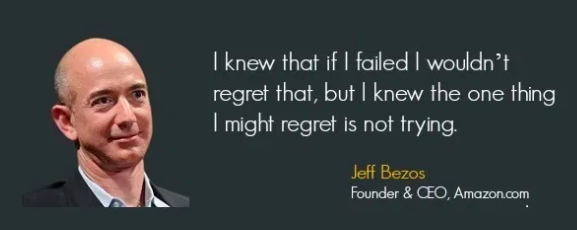The Top 10 reasons why Tech Startups fail in their 1st year


Don’t worry about failure. You have to be right only once.
– Drew Houston, Co-Founder – DropBox
Failure is natural. Failure is good. It teaches you a lot as it happens. However, if you don’t understand why it happened and don’t bounce back from it – then it’s the worse thing to happen. Based on what I have learnt in my 2 decades of experience as a solopreneur myself and having consulted many entrepreneurs – here is my list of Top 10 reasons why Tech Startups fail in the 1st year of their formation
Reason # 1 : Hazy Vision
Chase the vision, not the money. The money will end up following you.
– Tony Hseih, Co-Founder – Zappos
It all starts with a dream.
It is this dream that takes form of a defined vision. The vision doesn’t strike at once. It evolves. Sometimes, over a long time. And that is absolutely fine.
Where most Tech Startups falter is in discussing and documenting the vision in the complete clarity. Many are not even aware that there is a complete process behind it.
The Vision has to be crafted in as much detail as possible. The larger the time the Founders spend on their Vision Documentation, the better the final product will turn out to be. You can’t be in such a hurry to get to the market that you think spending too much time on the Business Plan is a waste.
The essential elements of the Vision Documentation which need to be brainstormed and chalked out are as follows :
- A Consumer Problem
- The Solution that solves the Consumer Problem
- Market Opportunity for the Solution – Why should you or an investor put their money in this?
- Competitor Research – Who and How they are doing it
- Software Development Plan – Prototype, Technology, Tools
- Marketing Plan – Modes and strategies of marketing (Offline, Online)
- Financial Plan – Money that will be needed to run the show and its sources
Again, this is just the tip of the iceberg. Delving deep into each of the above points and putting them down in Black And White is the key to making sure Reason # 1 is nipped in the bud.
Reason # 2 : Dearth of Knowledge
I find it hard to manage somebody’s work unless I have an intimate knowledge of how to do it myself.
– Justin Kan, Co-Founder – Justin.tv
Tech startups are mostly a blend of 2 worlds – Technology and the Core Domain which is being enabled by that technology.
Unless and until all the Founders have a knowledge of both these important components things are not going to move in the direction intended.
After all, learning is and should be a continuous part of a Startup Founder’s schedule. More so, if you are a Technology expert then learning the Core Domain becomes mandatory and vice versa.
If there are hurdles in the mind in either or all of the Founders, it will be a difficult game ahead since no one is going to understand the point of view of the other.
Also, it is important to mention that just because you are a Founder, doesn’t mean that you don’t have to understand the latest developments in your field since you won’t be doing the “ground-work”.
To get the ground work done by someone, you need to know the in and out of the implementation so that you can help when needed or at least give a high-level view to make things happen.
Reason # 3 : Underestimating Competitors
Pushing that last 5% harder is than your competitor is so often the difference between success and failure.
– Sam Altman, Y-Combinator
There is enough place for everyone in the market. Its how well you do your thing than your competitor that gives you an edge over him/her.
But for that you need to know where they stand and for that you need to do some good amount of research.
Competitor research could involve many aspects. Few of them being – Product Feature comparison, Revenue Mode, Revenue Figures, Funding received, App Traction, Response Time, Marketing Strategies, Fan Following.
At the high level the above would suffice to start off with.
At a SEO (Search Engine Optimization) level you could also figure out what keywords they rank for. There is nothing wrong or unethical in doing this. It only helps you prepare better for your SEO strategy.
Reason # 4 : Mutual Trust between Founders
Choose a Business Partner as carefully as you would choose a spouse!
– Emma Jones, Founder of Enterprise Nation
Trust is an important component of practically every relationship. More so in a business one! When 2 or more people come together to initiate a Startup most often then not it comes up as a casual idea.
Things then take a formal approach down the line and slowly work items start getting delegated as KRAs. And very rightfully so. There is nothing wrong with that.
One major reason for Tech Startups failing in their first year is core team clashes. Generally the clash is a lack of trust in the other person executing his part of the duties / KRA.
This is especially prevalent in Tech Startups for which the core domain is something else like EdTech, Fintech, HealthTech and so on. The person belonging to one domain doesn’t understand the decisions made by the other.
It sounds blatant to say this but a better way would be to blindly trust your Co-Founder. If you found him/her worthwhile to start a venture with, then he/she better be worthwhile enough to trust blindly for the decisions related to his/her domain.
Even with widely different profiles, it is how well you gel with the others not belonging to your core field of work and how diligently you believe that whatever decisions they take will be for the well being of the company.
That is the bottomline in preventing any fallouts.
Reason # 5 : Team Respect
Individuals don’t build great companies, teams do.
– Mark Suster, General Partner – GRP Partners.
A collection of good people, each excelling at what they do is the key to any Tech Startup’s success.
Good people are hard to find. You don’t take a magnifying glass and start looking for them and they don’t have a “good” label on their heads that you just pick them and make them start working.
When you undertake a recruitment activity, yes you define a Job Description document, you post the job, you interview people and take them on board if they satisfy your criteria. But do they all stay back always? Some will last in your company till the end of time, some will probably disappear on the next day.
There is a connection that is to be built with your team. And connection starts with mutual respect. No matter what the designation of the person whom you hire, its how much you respect and trust that person to do his/her job is what matters at the end of the day.
More importantly the relationship evolves in a stronger way when you take time and effort to mould them and to teach them so that they give you what you expect of them.
It takes a very strong team to create a sustainable business and there is a lot of effort that goes into it and it all starts with a basic level of respect.
Reason # 6 : Zero Standard Operating Processes
85% of the reasons for failure to meet the customer expectations are related to deficiencies in Systems and Processes .. rather than the Employee
– W. Edwards Deming
Expecting anyone to give results without Standard Operating Processes (SOPs) is like telling him/her to complete a marathon without giving them the directions of the track on which they are supposed to run.
Just like Business Vision Documentation should be in Black and White, the company’s SOPs also should be in Black & White. For every new joinee , they must be discussed and clarified so that they are adhered to the T.
To start off with some elements of a SOP for a Tech Startup could be outlined as follows. They could also be customised or tweaked as per your organisation, but the core thing is that they should exist and they should be implemented with discipline.
- Functional (Domain) Expertise Requirements
- Software Development
- Guidelines
- Tools
- Portfolio
- Release Plans
- Digital Marketing
- Budgeting
- Lead Analysis
- Content Management
- Physical Inventory Management
- Technical Support
- Training
- Back Office
- Hardware
- Vendors
- Accounts
- HR
- Salary Processing
- Recruitments
- Sales
- Targets
- Performance Monitoring
- Event Management
Reason # 7 : Understanding Funding
That’s the secret.
Convince yourself that your Startup is worth investing in, and then when you explain this to investors, they will believe in you.
– Paul Graham, Founder – Y Combinator
There have been Tech Startups who have applied for funding, just for the heck of it. They could have easily managed in a Bootstrapped way, but no! The fad is to get funded – Series A, Series B .. Series Z! They want it all.
And once it comes to them, they start strategising how to spend it!
Not all Tech Startups need that kind of money. In fact in the infant stage, no startup needs it. I would say, when you start an initiative, get your hands dirty with all that you can.
Chalk out the software development plan, get your hands dirty with content marketing. So what if it is not your field. Take up a course and do it.
Only then will you get an idea about what it takes to build all the elements of a successful business and only then will you understand the sweat and toil that goes into each activity that is needed to convert your vision to reality. And that’s the only way to know how much money you need where so that you can apply for funding.
Assessing this correctly will help you proceed in an organised and planned way rather than just jumping into it and seeing how much you can squeeze out because that is the in-thing to do.
Also remember at all points that more the investors in your company, more is the liquidity of your share. This is your dream, your vision and your sweat and toil has gone into it. Be frugal in giving it out.
Reason # 8 : Unclear Pitching
For the most effective pitch, focus 80% on the problem and 20% on the solution.
Dave McClure, Founder – 500 Startups
This originates from Tech Startup Failure Reason # 1 – Hazy Vision.
If your Business Vision Documentation is unclear, it is obvious that when you create a Pitch Deck, it will be a jumbled version of your thoughts.
I have seen Pitch Decks which even have a messed up Agenda – the first thing that you see when when you open up the Pitch Deck is messy and it puts an investor off immediately.
Ok, here’s the deal. A Pitch Deck is the simplest thing to create – provided of course, that your vision is clear. There are Pitch Deck templates available all over the web which have exactly the same elements which have been created after a lot of research with investors. Pick one up, fill in the blanks to the best of your capabilities and you are good to go! There is no rocket science there.
Reason # 9 : Overspending / Underspending
Penny wise, pound foolish
– Robert Burton (Scottish Proverb)
A proverb that often comes to my mind when I see some Tech Startup Founders creating Annual Budgets.
A lavish office space is included on top priority but increasing a Software Developer to deliver software faster is considered an overspend! This is that category who doesn’t know where to spend.
And then there is another category. Those who overspend because they have been funded. Hiring a Revenue Team with 15 people on board when 5 could easily do the job if you train them efficiently and give them the requisite process to meet their targets.
The frugal ones are actually a recommended kind. However, frugality to an exaggerated extent (sometimes when you would think twice before spending for an employee’s well being) – well that kind of does more harm than good.
Knowing where and how much to spend is half the battle won.
Reason # 10 : Lack of Persistence
I am convinced that half of what separates successful entrepreneurs from the non-successful ones is Perseverance
– Steve Jobs – Founder – Apple
Try, try till you succeed.
If you have a vision and you are convinced about its success then keep moving. Keep moving with your defined plan. Tweak the journey if the reality tells you so, but don’t quit too soon.
I have seen some Tech Startup Entrepreneurs starting off with an exit strategy in mind. If that is the case then you would rather not go on that path.
Having said that, I will contradict myself a little by saying that if you know you have done your best and have exhausted all your mental and physical resources trying to make it happen but if you still don’t see it budging – then sit back and take a call.
Don’t quit too soon, but if you have a conviction that the time has come when you know you have given it your everything but dragging it beyond this would only deplete you of your peace of mind, then think about the possibility of a hand-over or a closure.
It’s just about knowing the right decision to take at the right time.
Conclusion
The above were just the top 10 reasons that I have seen Tech Startups fail in the first year of operation. To each his own struggle. There may be reasons that I do not know off or I may have missed out listing.
It is possible that the solutions that I may have given for the above reasons are not acceptable to one and all. There maybe better solutions out there. What i have listed are the reasons I have encountered and the solutions that have worked for me. However, each scenario, each person has a different way of looking at it and that only opens up the doors to better experiences.
Do you think you have encountered any other reasons which contribute to Tech Startup Failure?
Need any brainstorming? I’m just a call away!
A Step-By-Step Course to help you with this
HAVE A TECH STARTUP BUSINESS IDEA BUT DON’T KNOW WHERE TO START?
Check out the 7-Step Digital Startup Success Formula Course.
This course is a knowledge base of that core experience I have gained in my journey. After having spent more than 20 years as an Employee, Entrepreneur and Consultant in the Digital Startup industry I saw the journey and the challenges faced during it. Be it product design, marketing, selling, funding each aspect of the journey needed to be taken up carefully – planned and executed with patience rather than rushing into it blindfolded. I have expressed all these concepts on the basis of an example so that the understanding is not just theoretical in nature. You will be able to learn the following :
- Defining / Documenting your Vision
- Team Vision
- Arranging Funds
- Crafting Your Product/Service system
- Marketing Your Product/Service
- Selling Your Product/Service
- Customer Service
The workshops will ensure that by the end of the course, you create the artefacts for their own business idea. You will have everything ready which will boost your confidence in your business idea in a defined and structured way
As a bonus, I will spend 30 mins with you to discuss the artefacts you have created so that we can clarify your doubts and tweak the artefacts if needed.

















Comments
Trackbacks & Pingbacks
[…] Here is some more insight on this – https://thegreycells.com/blog/top-10-reasons-why-startups-fail/ […]